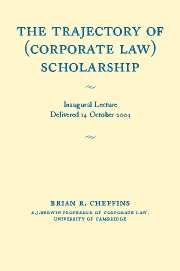 The Trajectory of (Corporate Law) Scholarship
The Trajectory of (Corporate Law) Scholarship II - Legal scholarship trajectories: an overview
Published online by Cambridge University Press: 06 January 2010
Summary
The ‘Cumulative’ Model: ‘Progress’ Towards ‘Truth’
The first of the five trajectories considered in this lecture is based on the idea that knowledge ‘accumulates’ as part of ‘progress’ towards an improved understanding of the matters under study. ‘Progress’ is a complex notion. For instance, even among those who have explicitly acknowledged its past influence on society, there is some doubt about the agent of change (e.g. human initiative v. cosmic intervention) and about whether there will be similar momentum in the future. Still, to the extent progress occurs, its general direction is clear: betterment and improvement. Moreover, it is fair to say that the concept implies the steady accumulation of knowledge over time.
Drawing these themes together, a first potential trajectory for legal scholarship is ‘cumulative’ in nature, with the presumption being that academics will be making headway in addressing issues considered important. To elaborate, legal scholars, being mindful of existing controversies, build upon the work of their predecessors. Over time, outstanding issues are resolved and new insights are derived from those resolutions. Sustained intellectual enquiry can thus be expected to yield a ‘better’ understanding of the topics under examination.
Natural science is the intellectual endeavor where the sort of accumulation of knowledge just described is thought of as taking place in its purest form.
- Type
- Chapter
- Information
- The Trajectory of (Corporate Law) ScholarshipAn Inaugural Lecture given in the University of Cambridge October 2003, pp. 4 - 38Publisher: Cambridge University PressPrint publication year: 2004
- 1
- Cited by


